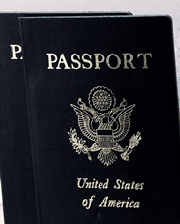In today's world, it's not uncommon for a U.S. citizen who lives in this country to be married to a non-citizen
who is a resident. Or two non-citizens may be married to each other while
living here.
The
tax law refers to non-citizens who are permanent U.S. residents as resident aliens.
Unfortunately, standard
estate tax planning advice that works for most married couples is not necessarily appropriate
when one or both spouses is a resident alien. Here is what these couples
need to know.
The Basic Rules
In general, American citizens and resident aliens are covered by the same set of federal estate tax rules. If you are in either category and die in 2016, the IRS will collect 40 percent of the amount of your taxable estate that exceeds $5.45 million (up from $5.43 million in 2015).
 Beware: Your estate will owe the tax even if some or all of your assets are outside
the U.S. Thankfully, the federal estate tax can often be minimized or
even completely avoided with advance planning. The most common strategy
is to bequeath (give away at death) some assets to your children and grandchildren
(either directly or via trust arrangements) while bequeathing the rest
to your surviving spouse.
Beware: Your estate will owe the tax even if some or all of your assets are outside
the U.S. Thankfully, the federal estate tax can often be minimized or
even completely avoided with advance planning. The most common strategy
is to bequeath (give away at death) some assets to your children and grandchildren
(either directly or via trust arrangements) while bequeathing the rest
to your surviving spouse.
For example, let's say you are an American citizen or a resident alien with an estate worth $6.5 million. You can completely avoid the federal estate tax by bequeathing $5.45 million to your children (the 2016 amount of your federal estate tax exemption) and bequeathing the remaining $1.05 million to your surviving spouse — as long as your spouse is a U.S. citizen. In fact, you can bequeath an unlimited amount to a citizen spouse free from federal estate tax. There may be an estate tax bill when your spouse dies, but that's a problem for the future.
Alternatively, while still living, you can gift away an unlimited amount to your spouse —provided he or she is a U.S. citizen — without any adverse gift tax consequences.
This privilege of being able to make unlimited tax-free wealth transfers to one's spouse is calledthe unlimited marital deduction. Taking advantage of this privilege is a key element of most estate planning strategies. So far, so good.
The Potential Problem with a Non-Citizen Spouse
Unfortunately, if your spouse is not a U.S. citizen, the unlimited marital deduction privilege is unavailable. This is true whether or not you are an American citizen.
Going back to the preceding example, let's say that you die in 2016 and bequeath $5.45 million to your children and the remaining $1.05 million to your non-citizen spouse. If your spouse was a U.S. citizen, the federal estate tax bill would be zero. But with a non-citizen spouse, your estate would be subject to a tax of 40 percent on the $1.05 million amount that exceeds the federal estate exemption of $5.45 million. If you bequeath your entire $6.5 million estate to your non-citizen spouse, the federal estate tax bill is the same. This is bad news if you've been wrongly assuming that you qualify for the unlimited marital deduction.
So What Can Be Done?

There are several ways to get around the non-citizen spouse tax dilemma. Depending on your circumstances, some strategies are more feasible than others.
First, you can make sure you marry an American citizen. Obviously this is not very practical if you are already married to a non-citizen.
Second, your spouse can become a citizen. This can occur even after you have died, but no later than the due date for filing the estate tax return, which is generally nine months after death. As long as your spouse attains citizen status before the deadline, the unlimited marital deduction is available — meaning your spouse can be left an unlimited amount free of federal estate taxes. However, your spouse may not want to become a U.S. citizen for various reasons. For example becoming an American citizen may require renouncing one's home country citizenship, which could affect the right to own property in that country.
A third possible solution involves setting up a qualified domestic trust (QDOT). This trust can be formed under the terms of your will, by the executor of your estate after you die, or by your surviving spouse. Basically, the assets inherited by your spouse go into the QDOT. Then the federal estate tax on the value of those assets is deferred until your spouse takes money out of the QDOT or dies. At that point, the QDOT assets are added back to your estate for tax purposes, and the deferred federal estate tax becomes due. In other words, the QDOT arrangement only defers the federal estate tax bill. It doesn't reduce the amount that ultimately must be paid to the U.S. Treasury. However, if your surviving spouse becomes a citizen, he or she can then take all the assets in the QDOT, and the deferred tax bill will disappear. In effect, your spouse will be treated as if he or she had been a citizen all along.
Finally, gifts made to your non-citizen spouse while you are still alive are also ineligible for the unlimited marital deduction, but they are eligible for a special annual gift tax exclusion privilege. For 2016, the exclusion is $148,000 (up from $147,000 in 2015), and it will be increased in future years to account for inflation. By taking advantage of this exclusion to make tax-free gifts to your non-citizen spouse, you can significantly reduce your taxable estate over the years and thereby reduce or avoid an estate tax bill after you die.
